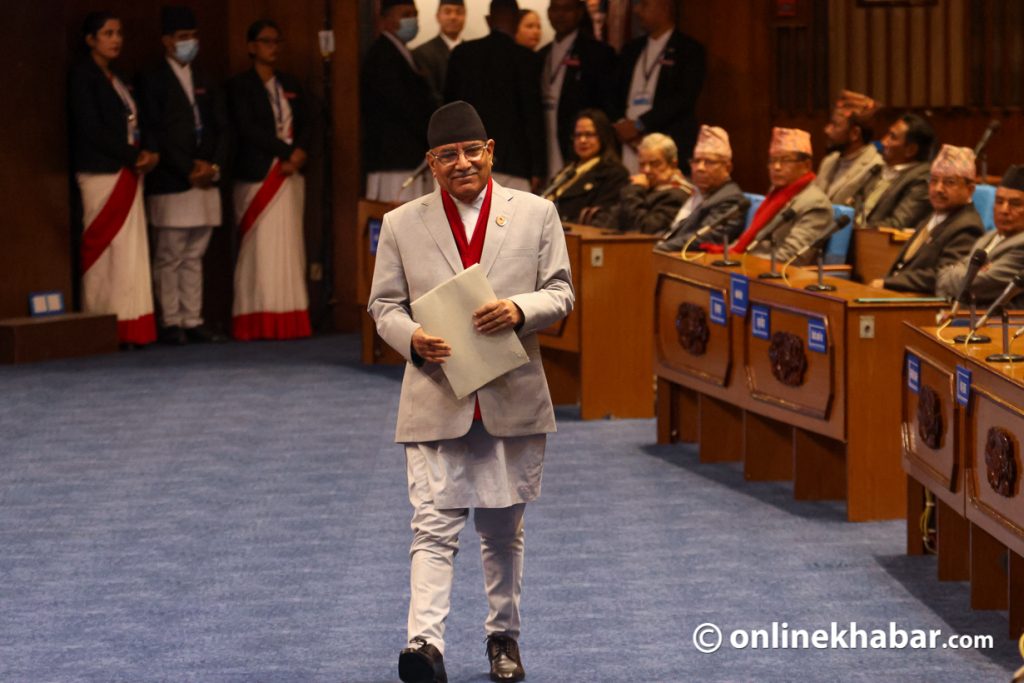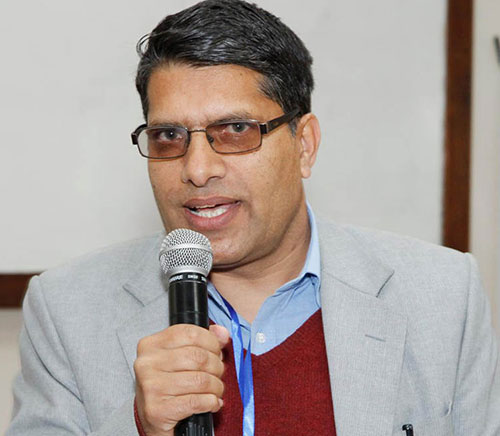The conflict of interest concept holds that one should abstain from making decisions when doing so would be to their best benefit. In Nepal, a person with an interest is called an expert, and his or her involvement in the decision is considered mandatory rather than recusal or separation from the decision.
Stephen Emond, the author of the Holistic Self-Realization book, writes, “90 percent of relationships are born out of misunderstandings, or relationships are born out of conflicting interests. Disagreements end in agreement, but conflicted subjects fail to find a solution. Therefore, a 10 percent conflict is 9 times stronger than a 90 percent conflict in destroying a relationship.”
Similarly, the chairman of the Constituent Assembly of India, VR Ambedkar, said, “Where ethics and money interests collide, money will always win. In money and ethics, ethics should be won. Still, if the vested interests do not get enough power to force themselves, then they will not know that they have separated themselves voluntarily.” He has given a message that this is a difficult task but it is inevitable.
Making decisions based on your own interests is not advisable. He/she should refrain from making decisions in this circumstance by using the same behavior, even if they were in government. Of course, it is generally agreed that one should begin their task only by publicly announcing that they have no conflict of interest in this topic before making a judgment. It is said that not only should one not participate in the decision-making of a matter related to one’s own interest, but also one should not participate even in the discussion of that matter. The reason behind doing this is to try to increase the credibility of decisions made in public places. In the area of justice, it is said that “Judgment is not only to be done but also to be seen to be done”.
Similarly, in the executive office, it is expected that the decision should not only be corrected but also be seen to be done. If there is disbelief towards the expected decision at first glance, no matter how honestly the decision is made, the conclusion that that decision was correct does not come out. As a result, it’s critical to teach the conviction that the decision was, is, and always will be fair, right, and accurate. Any decision made in the absence of this faith, regardless of how wise it may be, will be regarded as flawed.
Based on the belief that one person cannot serve two masters at the same time, this issue is basically a moral bond. A person has a public duty on the one hand and on the other hand, he has his own interests, so he cannot judge in both cases. So in such a case, no matter who the person is, no matter how high a position he is, he should stay away from the said decision. The United Nations Convention Against Corruption [UNCAC] clarifies the involvement of 3 elements in the matter of conflict of interest: “First public responsibility, second private interest and third undue pressure in the work” that is, if public and private interest collide, the inevitable result is improper action through undue pressure. The Organization of Economic Cooperation and Development [OECD] has also established a standard in the case of self-interest and its conclusion is that “Corruption occurs when self-interest is decided.”
After talking about principles and scriptures, it is almost mandatory to discuss Nepali politics. If you look at the picture of the recently formed Council of Ministers against the scriptures and beliefs, the result will be negative.
The Nepal Police is the investigating body in the Supreme Court’s case involving citizenship. The Ministry of Home Affairs oversees the Nepal Police, and the Home Minister is involved in this conflict.
The Ministry of Labor and Employment is the department in charge of handling the dispute when messages from people who have engaged in the foreign employment business and those who have recently traveled abroad are stuck abroad and have not found work become widely popular on social media. The disputed individual is also appointed as a minister of that ministry. The minister of the Ministry of Education is a similar example of a person with vested interests in private educational institutions.
He was successful in obtaining the largest contract in the nation as an A-class contractor, and the authority has launched a case alleging corruption while the issue is being heard in court. He was also chosen to be a minister.
There may be many others, but the four ministers mentioned above stand out. They speak for all parties other than Congress, UML, and Maoists. “Congress-UML Maoist leaders are corrupt, hence they should be stopped,” was their winning campaign slogan. To be more precise, they popularized the idea that “prioritizing good governance” and “doing corruption is like drinking mother’s blood,” but they are also some of the candidates who were elected on the basis of this idea.
Tell me, where are we at in terms of recognizing Nepal’s interest in this situation? How much difference is there in the slogan and practice of eliminating corruption along with ethics, transparency, and good governance? Who will notice the difference between speech and action? Or how will those who came to power deal with this question by saying that “One thing while out of power and another thing after coming to power has become the character of Nepali politics”? What will happen to the state of our country and society if the voters, who have been deceived and swayed for years, come to the conclusion that they have become more foolish this time? The questions are serious and unanswerable.
The above serious questions must be answered by the person who is in public accountability. A public official caught in the trap of double self-interest cannot be impartial. While judging one interest, another interest may be harmed or unjust. If the decision-making official is reluctant to stay away from that decision or that position in the case of conflicting interests, it is assumed that there will be bias in those particular decisions. When making a special decision, there will be a special setting to fulfill their interests. Doing so will demoralize the state agencies. It can be said that it is inevitable that the credibility of the state agencies will be undermined. There can be a conflict of interest in a particular business. When competitors have financial or personal relationships with ministers, officials, employees, or officials, they can influence every decision or action.
Conflicts of interest can have detrimental effects on the parties involved, the organizations they work for, and the general public. Due to their self-interest, individuals may engage in an immoral or criminal action, the most dreaded result of which is political corruption. In addition to governmental corruption, illegal trade and bribes will grow. They may also erode public confidence in all governmental institutions, officials, and agencies. The system of state operation will be utterly dismantled if the state structures, public office holders, political party leaders, party activist ideologues, and the general populace are coerced into acting in the public interest.
If the state ceases to function as a state, it will be transformed into a machine that relies on external conditions, and its power will be forfeited. The idea of law comes to an end. There will be no democracy. Autocracy then rears its ugly head once more. Those who put their lives in danger to fight tyranny lose some of their moral courage. After all, if the final result is authoritarianism, then it will not be of interest to anyone, regardless of whether it is done in the name of democracy or in the name of something else. People today think that by putting their trust in the state’s structures and the politicians in charge of them, their interests and riches are secure.
In this belief, the laws made by the state and the taxes determined by the state are also committed to paying. When this trust is lost, then there will be a situation of disobeying the laws made by the state and refusing to pay the taxes set by the state, then extreme chaos will begin. In anarchy, learned rules and laws will stop working. Sri Lanka is the latest example of the fact that the latest attack of anarchy is being done by public officials. In Sri Lanka, where the economic crisis reached its peak, the state collapsed and all the state agencies failed to maintain law and order. Then the target common people became the office of President and Prime Minister’s Office.
Many nations, as well as its organs and bodies, have put a lot of effort into locating and revealing conflicts of interest as a way to address them. Policies and procedures of a permanent character have been devised in order to manage the cases of conflict of interest that have been discovered and disclosed, and the adoption of their unqualified compliance has been recognized. It demands that people declare their financial and private interests, develop codes of behavior, and set up oversight organizations to check on compliance with these rules. Your self-interest is the first indicator that something has been compromised. Success can only be attained if one can forge a moral imperative to identify selfishness and let it be known without feeling guilty about it. Creating a culture of commitment to follow it will only be possible if there is a public comment if self-declaration is not available.
Finally, conflicts of interest are a frequent issue for nonprofit organizations, for-profit corporations, and even the government. It is also obvious that people’s or organizations’ decisions or every action are impacted when they have conflicting interests or worries, or whether they receive favoritism or loyalty from them whether it is voluntary or required. It goes without saying that selfishness can influence his choice. Conflicts of interest can result in immoral, unlawful, or criminal actions, which can erode public confidence in the government and its institutions. As a result, if we want to eliminate this kind of risk, we must identify the conflict of interest, make it public through self-declaration, or, if that is not possible, even if only the public comments are made, separate from the post or decision-making process, and manage effective policies and procedures to address it. Conditions must be established in order for them to be implemented successfully.
There are numerous instances where former finance ministers returned after receiving a clean bill of health, including Janardan Sharma who enabled unapproved middlemen to enter the budget, and Ramsharan Mahat who resigned owing to concerns about holding a foreign currency account. Given that the Supreme Court is currently debating whether or not his eligibility to serve in parliament due to his citizenship dispute, will the minister of home affairs dare to resign from the ministry on the grounds that his own interests have been compromised? Even if the agency looking into citizenship is part of the same ministry. Can he and the people who are in the limelight and who are not in every public office and position like him publicize their conflict of interest through self-declaration and stay away from that position or decision and set the standard of good governance? This is what people expect from those who do the most about transparency and good governance.
https://merotribune.com/2023/01/22/conflict-of-interest-in-nepali-politics/












